译林牛津版高中英语模块四Unit1Advertising 直接引语变间接引语 课件(共20张)
文档属性
| 名称 | 译林牛津版高中英语模块四Unit1Advertising 直接引语变间接引语 课件(共20张) |  | |
| 格式 | zip | ||
| 文件大小 | 601.9KB | ||
| 资源类型 | 教案 | ||
| 版本资源 | 牛津译林版 | ||
| 科目 | 英语 | ||
| 更新时间 | 2019-05-26 22:48:06 | ||
图片预览

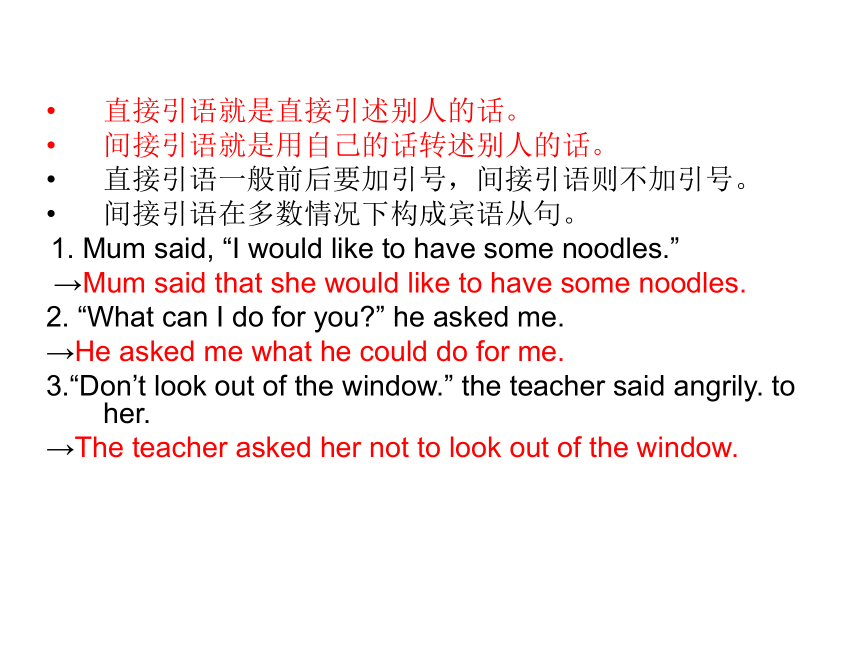
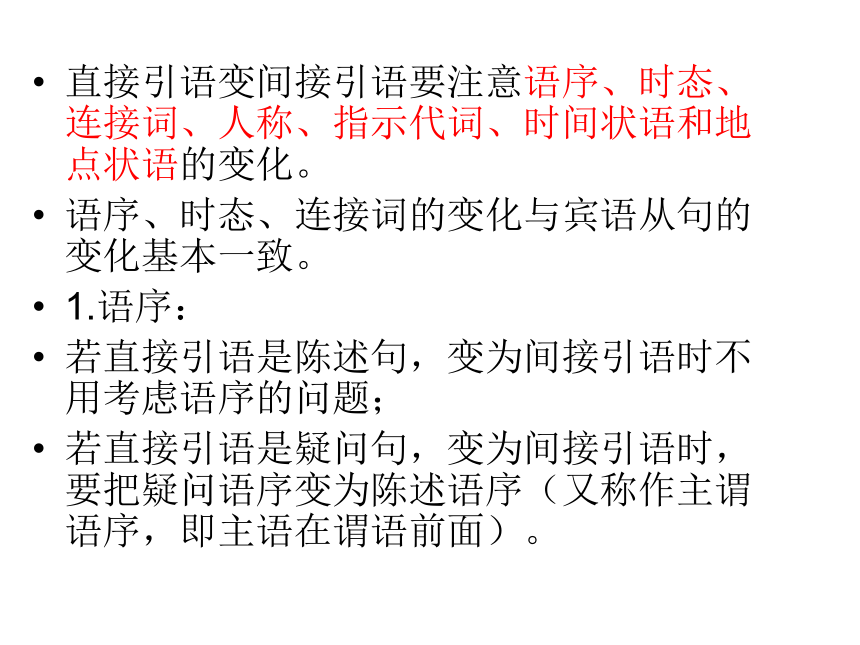


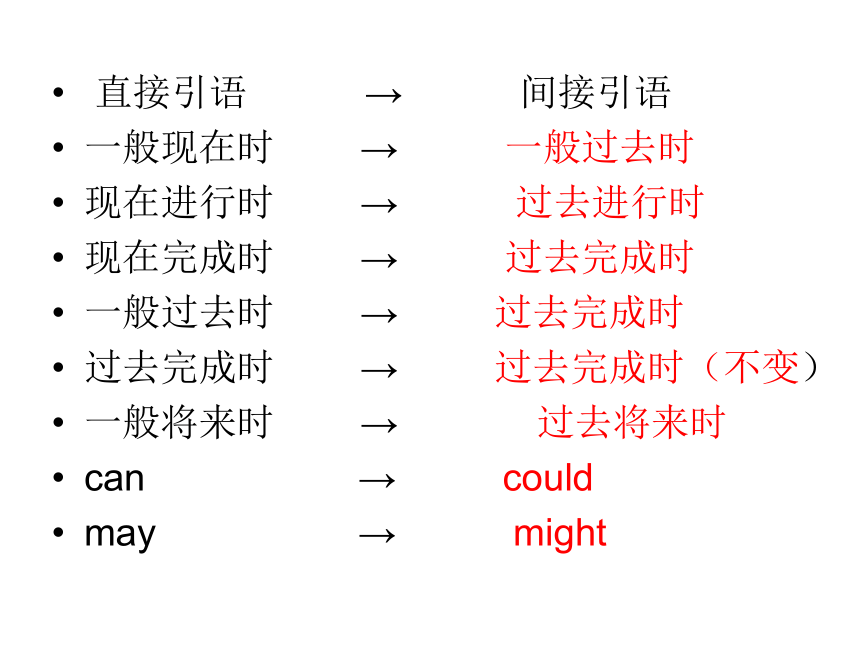
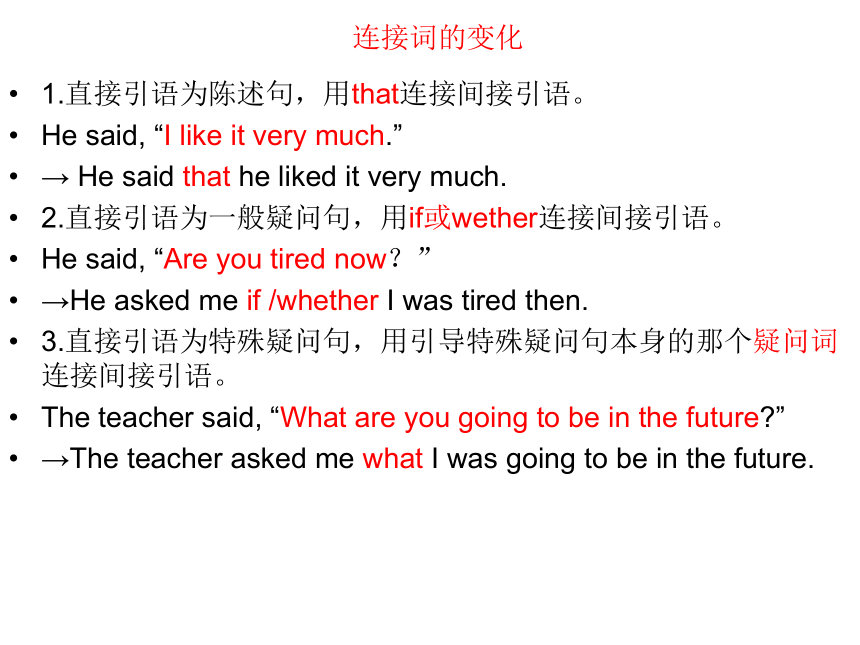
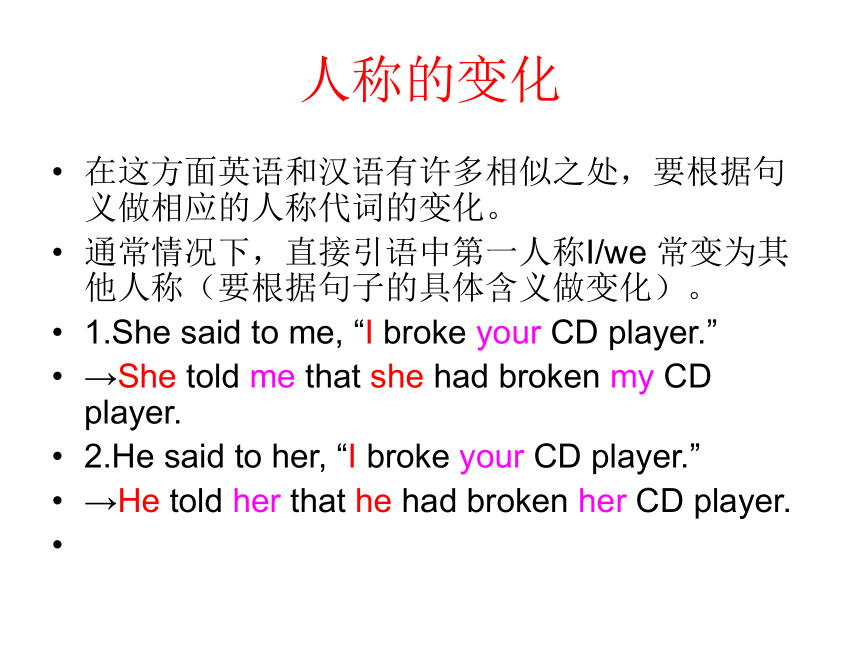
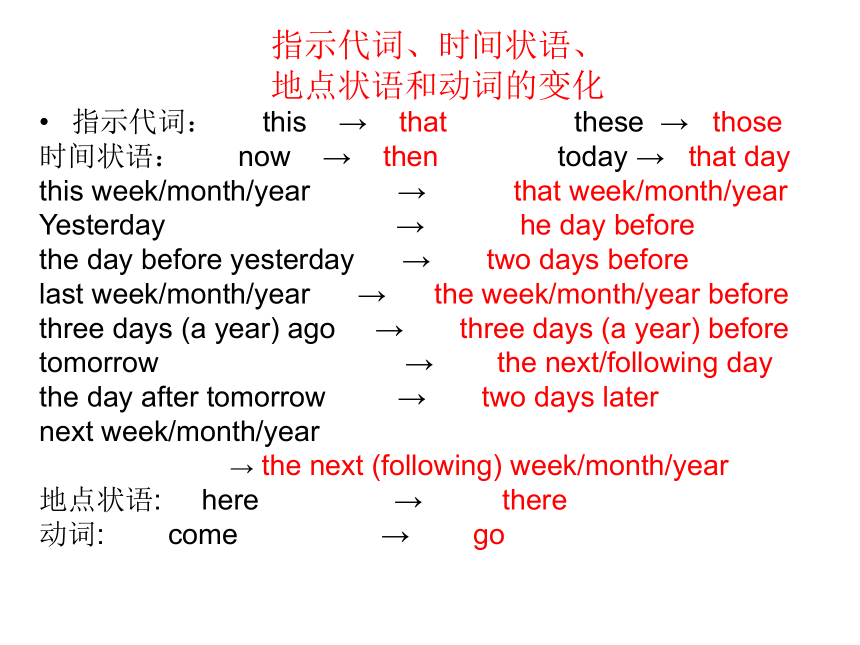
文档简介
课件20张PPT。直接引语变间接引语
直接引语就是直接引述别人的话。
间接引语就是用自己的话转述别人的话。
直接引语一般前后要加引号,间接引语则不加引号。
间接引语在多数情况下构成宾语从句。
1. Mum said, “I would like to have some noodles.”
→Mum said that she would like to have some noodles.
2. “What can I do for you?” he asked me.
→He asked me what he could do for me.
3.“Don’t look out of the window.” the teacher said angrily. to her.
→The teacher asked her not to look out of the window. 直接引语变间接引语要注意语序、时态、连接词、人称、指示代词、时间状语和地点状语的变化。
语序、时态、连接词的变化与宾语从句的变化基本一致。
1.语序:
若直接引语是陈述句,变为间接引语时不用考虑语序的问题;
若直接引语是疑问句,变为间接引语时,要把疑问语序变为陈述语序(又称作主谓语序,即主语在谓语前面)。What does Mary do on weekends? (疑问语序)
→I don’t know what Mary does on weekends. (陈述语序)
I don’t know what did I do wrong? ( ×)
→I don’t know what I did wrong. (√ ) 2.时态:
若主句的谓语动词是现在时,从句的时态不做变化。
She says her mother will come to see her.
若主句的谓语动词是一般过去时,直接引语变间接引语时,从句的谓语动词要做相应的变化。
She said her mother would come to see her.
若从句表达的是客观真理时,即使主句是过去时,从句仍然用一般现在时。
Few people knew the earth is around at that time. 直接引语 → 间接引语
一般现在时 → 一般过去时
现在进行时 → 过去进行时
现在完成时 → 过去完成时
一般过去时 → 过去完成时
过去完成时 → 过去完成时(不变)
一般将来时 → 过去将来时
can → could
may → might连接词的变化1.直接引语为陈述句,用that连接间接引语。
He said, “I like it very much.”
→ He said that he liked it very much.
2.直接引语为一般疑问句,用if或wether连接间接引语。
He said, “Are you tired now?”
→He asked me if /whether I was tired then.
3.直接引语为特殊疑问句,用引导特殊疑问句本身的那个疑问词连接间接引语。
The teacher said, “What are you going to be in the future?”
→The teacher asked me what I was going to be in the future.
人称的变化在这方面英语和汉语有许多相似之处,要根据句义做相应的人称代词的变化。
通常情况下,直接引语中第一人称I/we 常变为其他人称(要根据句子的具体含义做变化)。
1.She said to me, “I broke your CD player.”
→She told me that she had broken my CD player.
2.He said to her, “I broke your CD player.”
→He told her that he had broken her CD player.
指示代词、时间状语、 地点状语和动词的变化指示代词: this → that these → those
时间状语: now → then today → that day
this week/month/year → that week/month/year
Yesterday → he day before
the day before yesterday → two days before
last week/month/year → the week/month/year before
three days (a year) ago → three days (a year) before
tomorrow → the next/following day
the day after tomorrow → two days later
next week/month/year
→ the next (following) week/month/year
地点状语: here → there
动词: come → go 祈使句变间接引语若直接引语是祈使句,要将祈使句的动词原形变为带to的不定式,并在不定式的前面根据句子的意思加上tell, ask, order等动词,运用短语tell/ ask/order sb. to do sth.。
如果祈使句为否定句,在不定式前面加not。
1.“Make sure the door is shut.”
→He told his little son to make sure the door was shut.
2.“Don’t cry any more.” He said to his little sister.
→He asked his little sister not to cry any more. I’m good at riding motorbikes.I’m better at dancing than singing.I can do better in swimming.
(do well in sth/ doing sth)(be good at sth/ doing sth)What did Garfield say? I’m lazy.
He said he was lazy.
I’m hard-working sometimes. He said he was hard-working sometimes. I’m good at riding motorbikes. He said he was good at riding motorbikes.
I’m better at dancing than singing.
He said he was better at dancing than singing.
I can do better in swimming.
He said he could do better in swimming. 用动词的适当形式填空:1.He said he __________(go ) __________(visit) my home this week.
2. “ I don’t want to surprise you.” He said .
He said ____________________________________.
3. “ I will write a letter to my parents.” The girl said.
The girl said ______ _____________________________.
4.---What are you doing?
--I ___________________________(爬树)。
5.—What did you say?
--I said ___________________________(我身体健康。)would go visitinghe didn’t want to surprise me.she would write a letter to her parents.am climbing a tree.I was in a good healthMary asked, “could you help me cook dinner?”
2. He asked, “why are you so late for school, Jimmy?”
3. Will you tell me the answer to this question?
4. Where are you going for vacation, Tony?
5. Do you remember his birthday?
6. “What can I do for you?” he asked me.
7. “Are you interested in English?” he said.
8. “How are you feeling now?” the doctor asked.Mary asked me if I could help her cook dinner.He asked Jimmy why he was so late for school.She asked if I would tell her the answer to that question.I asked Tony where he was going for vacation.She asked if I remembered his birthday.He asked me what he could do for me.He asked if I was interested in English.The doctor asked me how I was feeling that time.1.He said , “I am not your friend .”
--- He said( that) he was not my friend.
2.She said “ I will come this morning.”
---She said( that) she would go that morning
3.She said , “I went there yesterday.”
---She said (that) she had gone there the day before .
.4. “we won’t be free tonight,”the students said.
---The students said that they wouldn’t be free that night.
5.“I am expecting a letter from my mother,” Betty said.
---Betty said that she was expecting a letter from her mother.
6. He said , “My sister was here three days ago.”
---He said that his sister had been there three days before. 将直接引语改为间接引语:
1.”I’m going home now.”she said.
She said_______________________
2. “I will call you tomorrow morning.”Alice said to Tom.
Alice _____ Tom ___________________________
3. “We are having a surprise party for Linda now.”
Marcia said________________________________
4. “You can do better.”His father said to him.
His father ______him _______________________
5. “I should try my best next time.” Jack thought.
Jack thought ______________________________
6. “We’re not going to have lessons this afternoon.”
The boy said to his father___________________
.she was going home then.told she would call him.they were having a …for …then.told he could do better.he should try his best the next time.→told they were not going to
have lessons that afternoon.
IV. 1.The building is very high.(改为感叹句)
____ ______the building is!
2.I was doing my homework.
My father came back from work.(合并为一句)
I was doing my homework_____ my father
came back home.
______ I was doing my homework , my
father came back home.
3.I was sleeping when he called me.(划线提问)
_____ ____ you _____when he called you?
4.He finished his homework last night.(同上)
_____ ___ he ___ last night?
How highwhenWhileWhat weredoingWhat did do5.They swam in the river.( at this time yesterday)
They ____ ________ in the river at this
time yesterday.
6.When my mother came in, I was watching TV.
_____ I ___ ________TV,my mother came in.
7.The boy was reading a novel when the
UFO landed.
_____ ____ the boy _____ when the UFO ….
8.My mother was cooking when I got home
yesterday afternoon.(改为一般疑问句 )
____ your mother ______ when you got … ?
______, ____ _____.were swimming Whilewas watchingWhat wasdoingWascookingYesshe wasBye-bye!!Good Luck!
直接引语就是直接引述别人的话。
间接引语就是用自己的话转述别人的话。
直接引语一般前后要加引号,间接引语则不加引号。
间接引语在多数情况下构成宾语从句。
1. Mum said, “I would like to have some noodles.”
→Mum said that she would like to have some noodles.
2. “What can I do for you?” he asked me.
→He asked me what he could do for me.
3.“Don’t look out of the window.” the teacher said angrily. to her.
→The teacher asked her not to look out of the window. 直接引语变间接引语要注意语序、时态、连接词、人称、指示代词、时间状语和地点状语的变化。
语序、时态、连接词的变化与宾语从句的变化基本一致。
1.语序:
若直接引语是陈述句,变为间接引语时不用考虑语序的问题;
若直接引语是疑问句,变为间接引语时,要把疑问语序变为陈述语序(又称作主谓语序,即主语在谓语前面)。What does Mary do on weekends? (疑问语序)
→I don’t know what Mary does on weekends. (陈述语序)
I don’t know what did I do wrong? ( ×)
→I don’t know what I did wrong. (√ ) 2.时态:
若主句的谓语动词是现在时,从句的时态不做变化。
She says her mother will come to see her.
若主句的谓语动词是一般过去时,直接引语变间接引语时,从句的谓语动词要做相应的变化。
She said her mother would come to see her.
若从句表达的是客观真理时,即使主句是过去时,从句仍然用一般现在时。
Few people knew the earth is around at that time. 直接引语 → 间接引语
一般现在时 → 一般过去时
现在进行时 → 过去进行时
现在完成时 → 过去完成时
一般过去时 → 过去完成时
过去完成时 → 过去完成时(不变)
一般将来时 → 过去将来时
can → could
may → might连接词的变化1.直接引语为陈述句,用that连接间接引语。
He said, “I like it very much.”
→ He said that he liked it very much.
2.直接引语为一般疑问句,用if或wether连接间接引语。
He said, “Are you tired now?”
→He asked me if /whether I was tired then.
3.直接引语为特殊疑问句,用引导特殊疑问句本身的那个疑问词连接间接引语。
The teacher said, “What are you going to be in the future?”
→The teacher asked me what I was going to be in the future.
人称的变化在这方面英语和汉语有许多相似之处,要根据句义做相应的人称代词的变化。
通常情况下,直接引语中第一人称I/we 常变为其他人称(要根据句子的具体含义做变化)。
1.She said to me, “I broke your CD player.”
→She told me that she had broken my CD player.
2.He said to her, “I broke your CD player.”
→He told her that he had broken her CD player.
指示代词、时间状语、 地点状语和动词的变化指示代词: this → that these → those
时间状语: now → then today → that day
this week/month/year → that week/month/year
Yesterday → he day before
the day before yesterday → two days before
last week/month/year → the week/month/year before
three days (a year) ago → three days (a year) before
tomorrow → the next/following day
the day after tomorrow → two days later
next week/month/year
→ the next (following) week/month/year
地点状语: here → there
动词: come → go 祈使句变间接引语若直接引语是祈使句,要将祈使句的动词原形变为带to的不定式,并在不定式的前面根据句子的意思加上tell, ask, order等动词,运用短语tell/ ask/order sb. to do sth.。
如果祈使句为否定句,在不定式前面加not。
1.“Make sure the door is shut.”
→He told his little son to make sure the door was shut.
2.“Don’t cry any more.” He said to his little sister.
→He asked his little sister not to cry any more. I’m good at riding motorbikes.I’m better at dancing than singing.I can do better in swimming.
(do well in sth/ doing sth)(be good at sth/ doing sth)What did Garfield say? I’m lazy.
He said he was lazy.
I’m hard-working sometimes. He said he was hard-working sometimes. I’m good at riding motorbikes. He said he was good at riding motorbikes.
I’m better at dancing than singing.
He said he was better at dancing than singing.
I can do better in swimming.
He said he could do better in swimming. 用动词的适当形式填空:1.He said he __________(go ) __________(visit) my home this week.
2. “ I don’t want to surprise you.” He said .
He said ____________________________________.
3. “ I will write a letter to my parents.” The girl said.
The girl said ______ _____________________________.
4.---What are you doing?
--I ___________________________(爬树)。
5.—What did you say?
--I said ___________________________(我身体健康。)would go visitinghe didn’t want to surprise me.she would write a letter to her parents.am climbing a tree.I was in a good healthMary asked, “could you help me cook dinner?”
2. He asked, “why are you so late for school, Jimmy?”
3. Will you tell me the answer to this question?
4. Where are you going for vacation, Tony?
5. Do you remember his birthday?
6. “What can I do for you?” he asked me.
7. “Are you interested in English?” he said.
8. “How are you feeling now?” the doctor asked.Mary asked me if I could help her cook dinner.He asked Jimmy why he was so late for school.She asked if I would tell her the answer to that question.I asked Tony where he was going for vacation.She asked if I remembered his birthday.He asked me what he could do for me.He asked if I was interested in English.The doctor asked me how I was feeling that time.1.He said , “I am not your friend .”
--- He said( that) he was not my friend.
2.She said “ I will come this morning.”
---She said( that) she would go that morning
3.She said , “I went there yesterday.”
---She said (that) she had gone there the day before .
.4. “we won’t be free tonight,”the students said.
---The students said that they wouldn’t be free that night.
5.“I am expecting a letter from my mother,” Betty said.
---Betty said that she was expecting a letter from her mother.
6. He said , “My sister was here three days ago.”
---He said that his sister had been there three days before. 将直接引语改为间接引语:
1.”I’m going home now.”she said.
She said_______________________
2. “I will call you tomorrow morning.”Alice said to Tom.
Alice _____ Tom ___________________________
3. “We are having a surprise party for Linda now.”
Marcia said________________________________
4. “You can do better.”His father said to him.
His father ______him _______________________
5. “I should try my best next time.” Jack thought.
Jack thought ______________________________
6. “We’re not going to have lessons this afternoon.”
The boy said to his father___________________
.she was going home then.told she would call him.they were having a …for …then.told he could do better.he should try his best the next time.→told they were not going to
have lessons that afternoon.
IV. 1.The building is very high.(改为感叹句)
____ ______the building is!
2.I was doing my homework.
My father came back from work.(合并为一句)
I was doing my homework_____ my father
came back home.
______ I was doing my homework , my
father came back home.
3.I was sleeping when he called me.(划线提问)
_____ ____ you _____when he called you?
4.He finished his homework last night.(同上)
_____ ___ he ___ last night?
How highwhenWhileWhat weredoingWhat did do5.They swam in the river.( at this time yesterday)
They ____ ________ in the river at this
time yesterday.
6.When my mother came in, I was watching TV.
_____ I ___ ________TV,my mother came in.
7.The boy was reading a novel when the
UFO landed.
_____ ____ the boy _____ when the UFO ….
8.My mother was cooking when I got home
yesterday afternoon.(改为一般疑问句 )
____ your mother ______ when you got … ?
______, ____ _____.were swimming Whilewas watchingWhat wasdoingWascookingYesshe wasBye-bye!!Good Luck!
